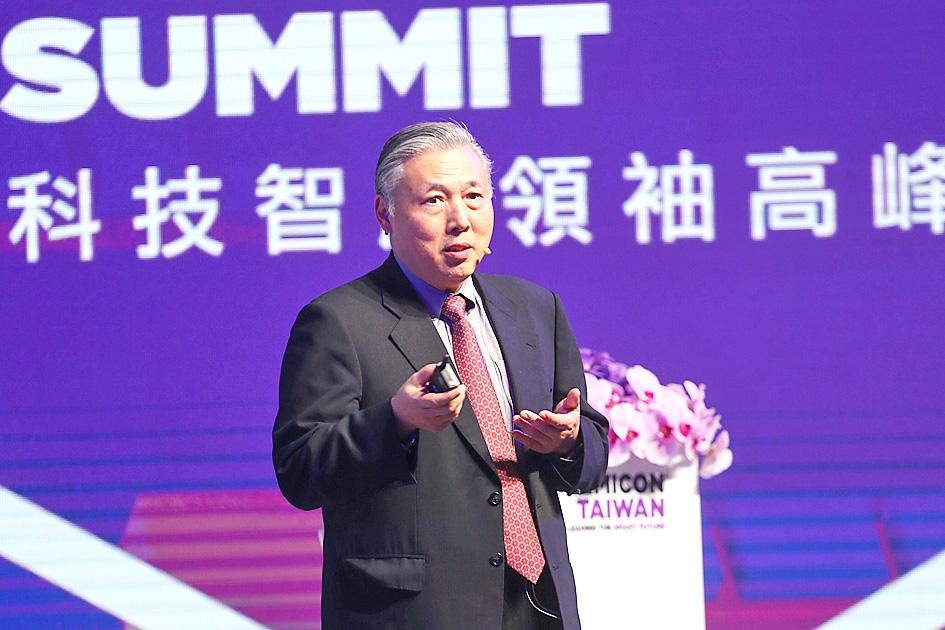ASE Technology Holding Co (日月光投控) yesterday said that capital expenditure this year might exceed the record US$2 billion spent last year, as demand for advanced packaging and testing services for chips used in high-performance computing, vehicles and 5G-related devices continues to be robust.
Long-term service agreements are in place through next year, ASE said, adding that discussions are being held with customers about further extensions, which could result in further capacity being added for loyal customers.
The world’s biggest chip assembler and tester said that the imbalance of semiconductor supply and demand is likely to extend beyond what it initially thought.

Photo: CNA
“Right now, we believe capacity and supply constraints will last beyond 2023,” ASE chief operating officer Tien Wu (吳田玉) told a virtual investors’ conference.
“We have seen broad-base growth in all sectors, with momentum carrying over into at least 2022,” Wu said, adding that production lines would be fully utilized.
He attributed slow equipment deliveries and uneven material supplies to the longer-than-expected supply crunch, although most companies in the semiconductor supply chain have announced capital expenditure to increase capacity.
Revenue from ASE’s core assembly and testing manufacturing (ATM) business this year is expected to increase two times faster than the global semiconductor industry’s annual rate of 5 to 10 percent, Wu said.
Gross margin of the ATM business would likely outpace record growth seen in 2014, he added.
Consolidated revenue this year would exceed last year’s NT$567 billion (US$20.38 billion), while last year was a 20 percent increase over 2020’s NT$477 billion, he said.
Gross margin would surpass last year’s 19.4 percent, Wu said.
Revenue would be fueled by robust end-market demand and a rising trend in outsourcing to integrated device manufacturers (IDMs), which design, make and sell chips, Wu said.
The chip crunch of the past two years has accelerated the pace of outsourcing to IDMs, he added.
It has also broken some rigid rules, he said, citing broad changes in supply-chain management within the auto industry.
To secure as many components as possible, automakers have become more willing to accept new suppliers, new materials and different qualification standards, Wu added.
The ATM business is likely to post US$1 billion this year from customers in the automotive segment, he said.
Revenue in ASE’s system-in-package service is expected to total US$500 million for this year, up from US$330 million last year, thanks to customers’ capacity expansions and growing product portfolios, he said.
ASE reported that net profit last year increased 132 percent to NT$63.91 billion, up from NT$27.59 billion in 2020, while earnings per share rose to NT$14.84 last year, up from NT$6.47 in 2020.
Disposal gains of US$1.46 billion from the sale of factories in China helped to boost last year’s earnings.
This quarter, ASE expects revenue in its ATM business to drop 4 percent from last quarter due to fewer working days — which is better than usual — while revenue from its electronics manufacturing services should total about NT$60 billion.

South Korea’s equity benchmark yesterday crossed a new milestone just a month after surpassing the once-unthinkable 5,000 mark as surging global memory demand powers the country’s biggest chipmakers. The KOSPI advanced as much as 2.6 percent to a record 6,123, with Samsung Electronics Co and SK Hynix Inc each gaining more than 2 percent. With the benchmark now up 45 percent this year, South Korea’s stock market capitalization has also moved past France’s, following last month’s overtaking of Germany’s. Long overlooked by foreign funds, despite being undervalued, South Korean stocks have now emerged as clear winners in the global market. The so-called “artificial intelligence

‘SEISMIC SHIFT’: The researcher forecast there would be about 1.1 billion mobile shipments this year, down from 1.26 billion the prior year and erasing years of gains The global smartphone market is expected to contract 12.9 percent this year due to the unprecedented memorychip shortage, marking “a crisis like no other,” researcher International Data Corp (IDC) said. The new forecast, a dramatic revision down from earlier estimates, gives the latest accounting of the ongoing memory crunch that is affecting every corner of the electronics industry. The demand for advanced memory to power artificial intelligence (AI) tasks has drained global supply until well into next year and jeopardizes the business model of many smartphone makers. IDC forecast about 1.1 billion mobile shipments this year, down from 1.26 billion the prior

NEW IDENTITY: Known for its software, India has expanded into hardware, with its semiconductor industry growing from US$38bn in 2023 to US$45bn to US$50bn India on Saturday inaugurated its first semiconductor assembly and test facility, a milestone in the government’s push to reduce dependence on foreign chipmakers and stake a claim in a sector dominated by China. Indian Prime Minister Narendra Modi opened US firm Micron Technology Inc’s semiconductor assembly, test and packaging unit in his home state of Gujarat, hailing the “dawn of a new era” for India’s technology ambitions. “When young Indians look back in the future, they will see this decade as the turning point in our tech future,” Modi told the event, which was broadcast on his YouTube channel. The plant would convert

People stand in a Pokemon store in Tokyo on Thursday. One of the world highest-grossing franchises is celebrated its 30th anniversary yesterday.